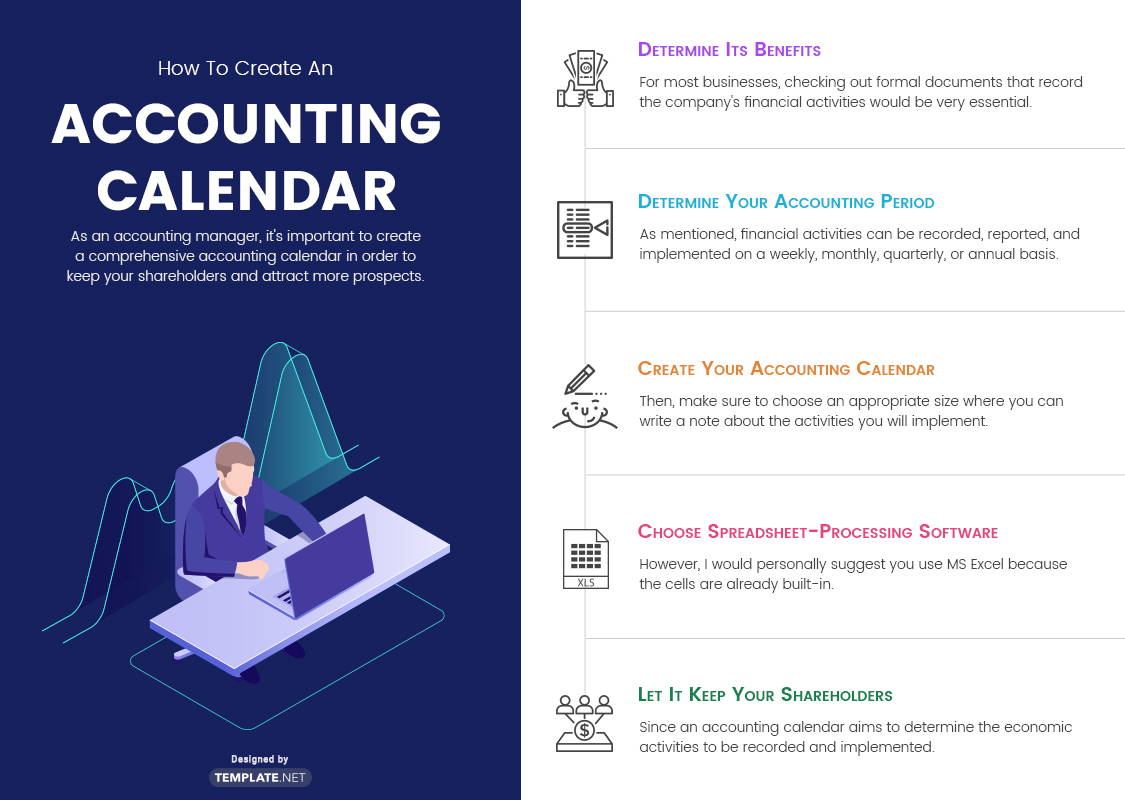Keeping track of financial activities whether, on a monthly, quarterly, or annual basis, the shareholders would want to determine how the business operations were financed on a certain period. As an accounting manager, you want to make sure you were able to give a comprehensive fiscal year report to your stakeholder(s). We understand your endeavors, that's why we are here to help you out. Utilize our professionally and comprehensively designed ready-made Accounting Calendar Templates only here. Available in all file formats including your required formats. They are available in A4 and US letter sizes as well. Moreover, the templates are 100% customizable and can be personalized for your ease. Download today and create the most competitive accounting calendar that will keep your current stakeholders and attract more prospects.
How To Create An Accounting Calendar?

An accounting calendar is a bookkeeping document where all financial activities were recorded and reported whether on a weekly, monthly, or yearly basis (year calendar). In addition to recording financial activities, an accounting desk calendar also aims to anticipate the schedule or dates for financial activities such as fund-raising, invoice, retail services, etc. Further, an accounting calendar conforms with the established range of time during which accounting functions will be performed and analyzed — for which, may also be known as an accounting calendar year.
As an accounting manager, it's important to create a comprehensive accounting calendar in order to keep your shareholders and attract more prospects. We know you want to make a competitive accounting calendar, so here are some tips and considerations for you to make one.
1. Determine Its Benefits
For most businesses, checking out formal accounting documents that record the company's financial activities would be very essential for a stakeholder to keep track of the company's productivity and/or marketing growth. This way, the business does not only impress the current stakeholders, but also the potential ones. Especially when the economic activity is quite interesting like fund-raising for a community outreach program or anything that improves marketing strategies like inviting more business connections.
2. Determine Your Accounting Period
As mentioned, financial activities can be recorded, reported, and implemented on a weekly, monthly, quarterly, or annual basis. By which case, you will have to choose and define as well as weighing your choice of an accounting period. When you choose to make it on a weekly schedule basis, then there would be close monitoring on the economic activities implemented but when it's on a quarterly basis, then there would be long-term monitoring. You decide which is more preferable.
3. Create Your Accounting Calendar
As soon as you have determined your accounting period, begin creating your printable calendar. As you create your calendar, make sure it conforms to the calendar that your company is using(say construction accounting calendar). Say, it's a Christian calendar, then use the Christian calendar. Then, make sure to choose an appropriate size where you can write a note about the activities you will implement or have been implemented. Make sure though that when you write a note, it's limited to 3 to 5 words only or however you wish as long as you are able to determine such.
4. Choose Spreadsheet-Processing Software
There is a lot of spread-processing software you can choose from. You may also choose MS Word since it's also easy to make tables as well.
5. Let It Keep Your Shareholders
Since an accounting calendar aims to determine the economic activities to be recorded and implemented, then this aims to identify what are the things to be done in the accounting period. An accounting calendar doesn't just record and anticipate economic activities, it also keeps proposing your project or brand to your shareholders to keep them supporting your business and might as well attract more.
